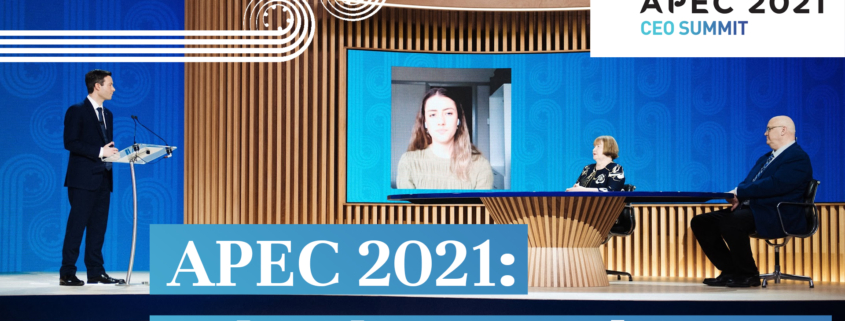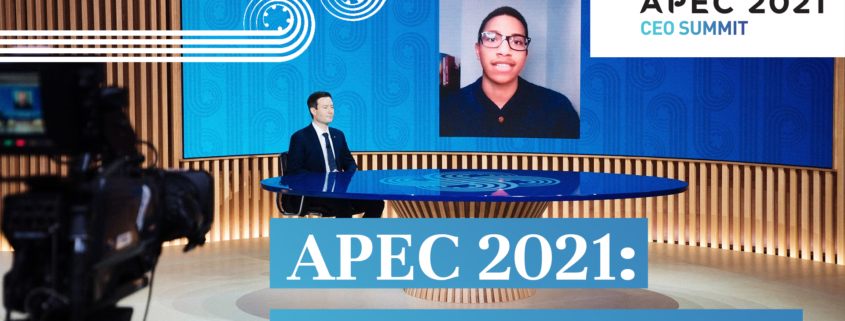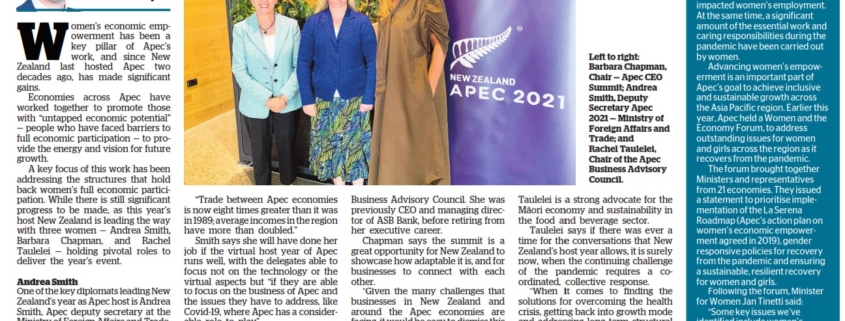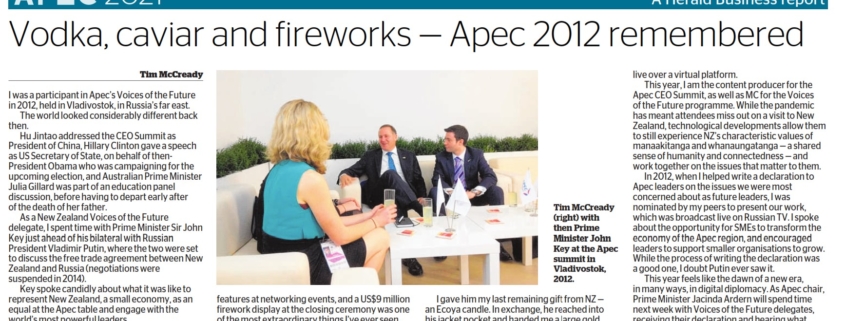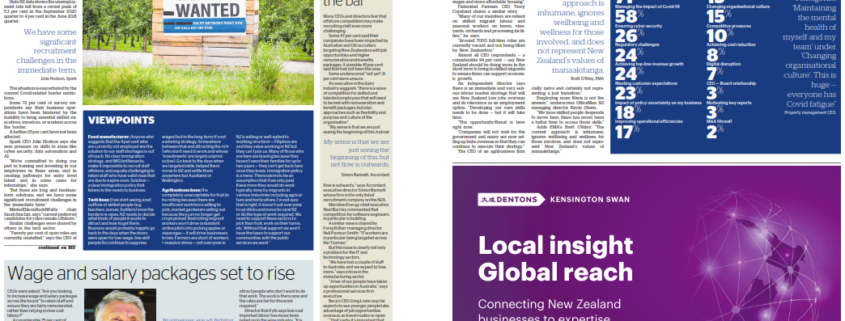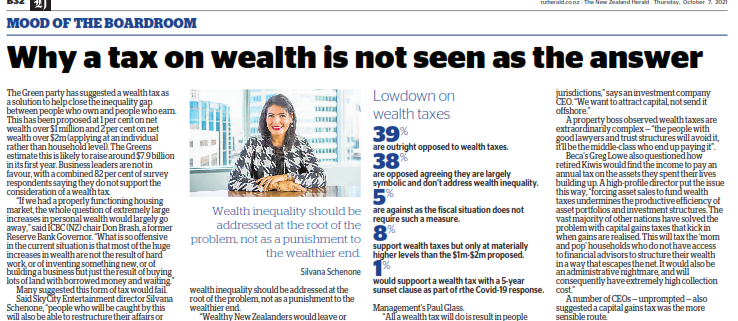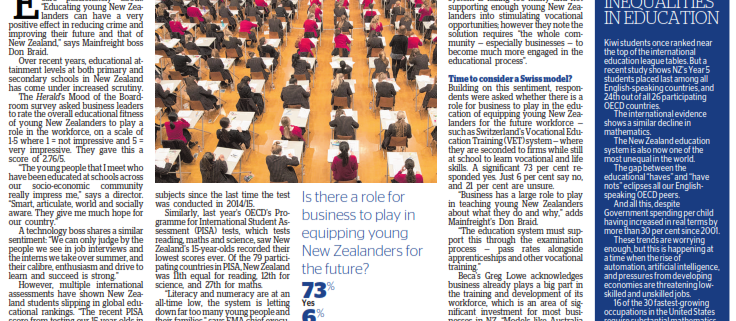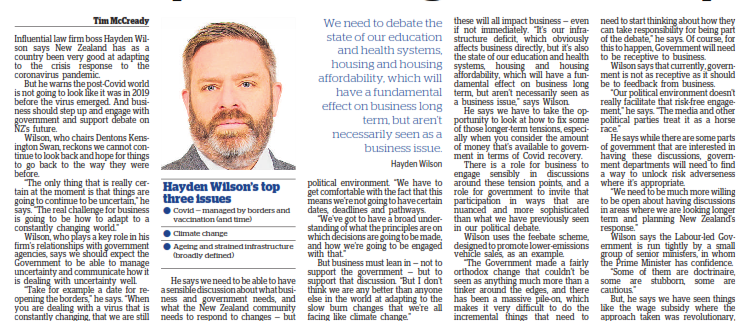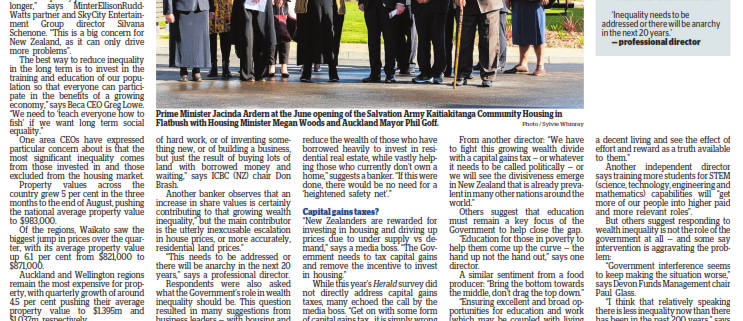APEC 2021: The Kiwi women moving the world forward at Apec 2021 (NZ Herald)
APEC 2021: The Kiwi women moving the world forward at Apec 2021 (NZ Herald)
Women’s economic empowerment has been a key pillar of Apec’s work, and since New Zealand last hosted Apec two decades ago, has made significant gains.
Economies across Apec have worked together to promote those with “untapped economic potential” — people who have faced barriers to full economic participation — to provide the energy and vision for future growth.
A key focus of this work has been addressing the structures that hold back women’s full economic participation. While there is still significant progress to be made, as this year’s host New Zealand is leading the way with three women — Andrea Smith, Barbara Chapman, and Rachel Taulelei — holding pivotal roles to deliver the year’s event.
Andrea Smith
One of the key diplomats leading New Zealand’s year as Apec host is Andrea Smith, Apec deputy secretary at the Ministry of Foreign Affairs and Trade.
She has been in the role since 2017, and in that time has seen events that have put New Zealand’s hosting of Apec at risk — including the fire at the Sky City International Convention Centre fire where the CEO Summit was originally to be held, and the Covid-19 pandemic, which ground travel to a halt and forced Apec to go fully virtual.
Smith says that as host, New Zealand is at the leading edge of shaping the agenda for the Asia-Pacific and has “skin in the game”.
“Fourteen of our top 20 export markets are Apec members, including the three largest economies in the world — the United States, China and Japan — and 18 of our 19 free trade agreements are with Apec partners.” says Smith.
“Trade between Apec economies is now eight times greater than it was in 1989; average incomes in the region have more than doubled.”
Smith says she will have done her job if the virtual host year of Apec runs well, with the delegates able to focus not on the technology or the virtual aspects but “if they are able to focus on the business of Apec and the issues they have to address, like Covid-19, where Apec has a considerable role to play”.
Barbara Chapman
Chair of the Apec CEO Summit, Barbara Chapman is also chair of Genesis Energy and NZME, publisher of the New Zealand Herald, an independent director of Fletcher Building, a member of the independent expert advisory panel for the New Zealand Reserve Bank Act review and a previous member of the Prime Minister’s Business Advisory Council. She was previously CEO and managing director of ASB Bank, before retiring from her executive career.
Chapman says the summit is a great opportunity for New Zealand to showcase how adaptable it is, and for businesses to connect with each other.
“Given the many challenges that businesses in New Zealand and around the Apec economies are facing, it would be easy to dismiss this opportunity and focus on the day-to-day issues.
“But given the critical need for international connections, trade pathways, and digital technology to revive and repair some of the Covid-damaged parts of our economies and our trading networks, this is a once-in-a-generation opportunity for New Zealand businesses, organisations and individuals to hear from the world’s leading thinkers and be part of these important conversations.”
Rachel Taulelei
Co-founder of business design and brand strategy firm Oho, Rachel Taulelei is New Zealand’s lead representative and 2021 chair of the Apec business advisory council (Abac).
A prominent business leader, Taulelei is a strong advocate for the Māori economy and sustainability in the food and beverage sector.
Taulelei says if there was ever a time for the conversations that New Zealand’s host year allows, it is surely now, when the continuing challenge of the pandemic requires a co-ordinated, collective response.
“When it comes to finding the solutions for overcoming the health crisis, getting back into growth mode and addressing long term structural issues like sustainability, digitalisation and inclusion, Abac ensures the voice of business is heard,” she says.
For Taulelei, this means putting people at the centre of everything we do.
“We need to do so in a way that respects and preserves the environment in which we live. And we have to continue to have regard for continuing to advance economic well-being,” she says.
At this week’s CEO Summit, Taulelei will be speaking on a panel about sustainability, and the areas the Apec region should be thinking about and working together on to tackle the environmental crisis, address climate change, and foster green, resilient and inclusive growth.
Women and the economy
Covid-19 has disproportionately impacted women’s employment. At the same time, a significant amount of the essential work and caring responsibilities during the pandemic have been carried out by women.
Advancing women’s empowerment is an important part of Apec’s goal to achieve inclusive and sustainable growth across the Asia Pacific region. Earlier this year, Apec held a Women and the Economy Forum, to address outstanding issues for women and girls across the region as it recovers from the pandemic.
The forum brought together Ministers and representatives from 21 economies. They issued a statement to prioritise implementation of the La Serena Roadmap (Apec’s action plan on women’s economic empowerment agreed in 2019), gender responsive policies for recovery from the pandemic and ensuring a sustainable, resilient recovery for women and girls.
Following the forum, Minister for Women Jan Tinetti said:
“Some key issues we’ve identified include women’s representation in trade, changes to address gender pay gaps and occupational segregation, the disproportionate share of care work undertaken by women and girls, equal access to digital skill training and financial literacy and gender-based violence…
“We are committed to further improving the lives of women and girls in Aotearoa NZ. Our focus includes developing a Women’s Employment Action Plan to support women to build back better after the pandemic, women in leadership, closing the gender pay gap, safety from family and sexual violence and improving outcomes for wāhine Māori.
• In the Apec region, 77 women are working for every 100 men. In the rest of the world it is 67 women for every 100 men. No economy has top female managers in more than 30 per cent of firms
APEC 2021: Think Apec on Zoom is wild? Try Russia in 2012 (NZ Herald)
APEC 2021: Think Apec on Zoom is wild? Try Russia in 2012 (NZ Herald)
I was a participant in Apec’s Voices of the Future in 2012, held in Vladivostok, in Russia’s far east. The world looked considerably different back then.
Hu Jintao addressed the CEO Summit as President of China, Hillary Clinton gave a speech as US Secretary of State, on behalf of then-President Obama who was campaigning for the upcoming election, and Australian Prime Minister Julia Gillard was part of an education panel discussion, before having to depart early after of the death of her father.
As a New Zealand Voices of the Future delegate, I spent time with Prime Minister Sir John Key just ahead of his bilateral with Russian President Vladimir Putin, where the two were set to discuss the free trade agreement between New Zealand and Russia (negotiations were suspended in 2014).
Key spoke candidly about what it was like to represent New Zealand, a small economy, as an equal at the Apec table and engage with the world’s most powerful leaders.
Of course, one of the highlights of travelling to Apec was the cultural immersion and the people I met.
Russia went all out hosting Apec — US$21 billion was spent getting the city ready for the summit, vodka and caviar were prominent features at networking events, and a US$9 million firework display at the closing ceremony was one of the most extraordinary things I’ve ever seen.
At the summit’s gala dinner, I was introduced to the father of one of the Russian Voices of the Future participants. He was surrounded by bodyguards, and, unbeknown to me, was the Russian Energy minister.
I gave him my last remaining gift from NZ — an Ecoya candle. In exchange, he reached into his jacket pocket and handed me a large gold coin, minted to commemorate the new 1800km-long gas pipeline to Vladivostok.
Fast-forward nine years and it is NZ’s turn to host Apec. Things look so different now, with the pandemic requiring the summit to be delivered live over a virtual platform.
This year, I am the content producer for the Apec CEO Summit, as well as MC for the Voices of the Future programme. While the pandemic has meant attendees miss out on a visit to New Zealand, technological developments allow them to still experience NZ’s characteristic values of manaakitanga and whanaungatanga — a shared sense of humanity and connectedness — and work together on the issues that matter to them.
In 2012, when I helped write a declaration to Apec leaders on the issues we were most concerned about as future leaders, I was nominated by my peers to present our work, which was broadcast live on Russian TV. I spoke about the opportunity for SMEs to transform the economy of the Apec region, and encouraged leaders to support smaller organisations to grow. While the process of writing the declaration was a good one, I doubt Putin ever saw it.
This year feels like the dawn of a new era, in many ways, in digital diplomacy. As Apec chair, Prime Minister Jacinda Ardern will spend time next week with Voices of the Future delegates, receiving their declaration and hearing what matters to them, ahead of her meeting with leaders of the 21 Apec economies.
It is the next generation, after all, who are the biggest stakeholders in the work that Apec is doing.
CEO plea - 'Open border so we can source staff'
CEO plea – ‘Open border so we can source staff’
The tight New Zealand labour market threatens to undermine our post-pandemic economic recovery as skills shortages increase.
It is such a headache for CEOs that a considerable 71 cent of respondents to the Herald survey say sourcing and retaining skilled staff is one of the key issues keeping them awake at night.
Stats NZ data shows the unemployment rate fell from a recent peak of 5.3 per cent in the September 2020 quarter to 4 per cent in the June 2021 quarter.
The situation is exacerbated by the current Covid-related border restrictions.
Some 72 per cent of survey respondents say their business operations have been hindered by the inability to bring essential skilled executives, investors, or workers across the border.
A further 25 per cent have not been affected.
Spark CEO Jolie Hodson says she sees pressure on skills in areas like cyber security, data automation and AI.
“We’re committed to doing our part in training and investing in our employees in these areas, and in creating pathways for entry level talent and in some cases for internships,” she says.
“But these are long and medium-term solutions, and we have some significant recruitment challenges in the immediate term.”
MinterEllisonRuddWatts chair Sarah Sinclair, says “current preferred candidates for roles remain offshore.”
Similar challenges were shared by others in the tech sector.
“Twenty per cent of open roles are currently unstaffed,” says the CEO of a major IT firm.
But this issue isn’t restricted to any particular sector.
Tim Myers, chief executive of farm machinery firm Norwood says there is a desperate shortage of skilled technicians and mechanics.
“One, there aren’t enough, and two, they’re being incentivised to move to Australia with more competitive wages and more affordable housing”.
Federated Farmers CEO Terry Copeland shares a similar story.
“Many of our members are reliant on skilled migrant labour and seasonal workers on farms, vineyards, orchards and processing facilities,” he says.
“Around 7000 full-time roles are currently vacant and not being filled by New Zealanders.”
Almost all CEO respondents — a considerable 94 per cent — say New Zealand should be doing more in the short term to bring in skilled migrants to ensure firms can support economic growth.
An independent director says there is an immediate and very serious labour market shortage that will see New Zealand lose jobs overseas and its relevance as an employment option. “Developing our own skills needs to be done — but it will take time.
“The opportunity/threat is here right now.
“Companies will not wait for the government and many are now setting up hubs overseas so that they can continue to execute their strategy.”
The CEO of an agribusiness firm says the widespread business impacts that the lack of workers is having on the industry requires urgent attention.
“If we are going to become less reliant on migrant workers, it will take time — years.
“Just pulling the pin as has been the case is poor judgement, commercially naïve and certainly not representing a just transition.”
Employing more Kiwis is not the answer,” underscores OfficeMax NZ managing director Kevin Obern.
“We have skilled people desperate to move here, there has never been a better time to access those skills.”
Adds EMA’s Brett O’Riley: “The current approach is inhumane, ignores wellbeing and wellness for those involves, and does not represent New Zealand’s values of manaakitanga.”
Why a tax on wealth is not seen as the answer
Why a tax on wealth is not seen as the answer
The Green party has suggested a wealth tax as a solution to help close the inequality gap between people who own and people who earn. This has been proposed at 1 per cent on net wealth over $1 million and 2 per cent on net wealth over $2m (applying at an individual rather than household level).
The Greens estimate this is likely to raise around $7.9 billion in its first year. Business leaders are not in favour, with a combined 82 per cent of survey respondents saying they do not support the consideration of a wealth tax.
“If we had a properly functioning housing market, the whole question of extremely large increases in personal wealth would largely go away,” said ICBC (NZ) chair Don Brash, a former Reserve Bank Governor. “What is so offensive in the current situation is that most of the huge increases in wealth are not the result of hard work, or of inventing something new, or of building a business but just the result of buying lots of land with borrowed money and waiting.”
Many suggested this form of tax would fail.
Said SkyCity Entertainment director Silvana Schenone, “people who will be caught by this will also be able to restructure their affairs or seek advice to not trigger the wealth tax. Also, wealth inequality should be addressed at the root of the problem, not as a punishment to the wealthier end.
“Wealthy New Zealanders would leave or restructure their affairs,” agreed Devon Funds Management’s Paul Glass.
“All a wealth tax will do is result in people shifting their assets to more desirable jurisdictions,” says an investment company CEO. “We want to attract capital, not send it offshore.”
A property boss observed wealth taxes are extraordinarily complex — “the people with good lawyers and trust structures will avoid it, it’ll be the middle-class who end up paying it”.
Beca’s Greg Lowe also questioned how retired Kiwis would find the income to pay an annual tax on the assets they spent their lives building up. A high-profile director put the issue this way, “forcing asset sales to fund wealth taxes undermines the productive efficiency of asset portfolios and investment structures. The vast majority of other nations have solved the problem with capital gains taxes that kick in when gains are realised. This will tax the ‘mom and pop’ households who do not have access to financial advisors to structure their wealth in a way that escapes the net. It would also be an administrative nightmare, and will consequently have extremely high collection cost.”
A number of CEOs — unprompted — also suggested a capital gains tax was the more sensible route.
What can we learn from business?
What can we learn from business?
Education is an issue CEOs care passionately about. “Educating young New Zealanders can have a very positive effect in reducing crime and improving their future and that of New Zealand,” says Mainfreight boss Don Braid.
Over recent years, educational attainment levels at both primary and secondary schools in New Zealand has come under increased scrutiny.
The Herald’s Mood of the Boardroom survey asked business leaders to rate the overall educational fitness of young New Zealanders to play a role in the workforce, on a scale of 1-5 where 1 = not impressive and 5 = very impressive. They gave this a score of 2.76/5.
“The young people that I meet who have been educated at schools across our socio-economic community really impress me,” says a director. “Smart, articulate, world and socially aware. They give me much hope for our country.”
A technology boss shares a similar sentiment: “We can only judge by the people we see in job interviews and the interns we take over summer, and their calibre, enthusiasm and drive to learn and succeed is strong.”
However, multiple international assessments have shown New Zealand students slipping in global educational rankings. “The recent PISA score from testing our 15-year-olds in reading, maths and science was the lowest ever in the OECD, and a similar story occurs in the 2020 TIMSS global comparison,” says chair Craig Stobo. “To then hear the Minister of Education say this year that we should celebrate the achievements of pupils in other countries left me speechless.”
The most recent Trends in International Mathematics and Science Study (TIMSS) saw New Zealand Year 9 students’ scores fall by the largest margins since the study began in 1994. Their maths score fell 11 points to 482 and their science score fell 14 points to 499, on a scale where 500 is the midpoint.
New Zealand’s scores for Year 5 students (9-year-olds) also fell in both subjects since the last time the test was conducted in 2014/15.
Similarly, last year’s OECD’s Programme for International Student Assessment (PISA) tests, which tests reading, maths and science, saw New Zealand’s 15-year-olds recorded their lowest scores ever. Of the 79 participating countries in PISA, New Zealand was 11th equal for reading, 12th for science, and 27th for maths.
“Literacy and numeracy are at an all-time low, the system is letting down far too many young people and their families,” says EMA chief executive Brett O’Riley.
We have some outstanding educational achievement results in some parts of our education system, but weaker results in other parts which represent a big lost opportunity both for our people and our country,” says Beca CEO Greg Lowe. “No New Zealander should be left behind in the journey to better skills.”
“It feels like standards continue to slip and that mediocre is now okay,” says a food producer. “A drift to the lowest common denominator.”
From an investment firm boss: “A big worry — with an annual deterioration in standards and achievements wrapped in a cloak of wokeism and irrelevance.”
Federated Farmers CEO Terry Copeland says our fall in international rankings is down to a “combination of low literacy and numeracy skills, and less common sense due to reliance on computers”.
But another respondent, from the education sector, comments: “Working closely with education, I think the attainment metrics aren’t everything. We have a system that teaches great critical thinking and inquiry-based learning which help foster innovation.”
One director says the education system is failing too many and not supporting enough young New Zealanders into stimulating vocational opportunities; however they note the solution requires “the whole community — especially businesses — to become much more engaged in the educational process”.
Time to consider a Swiss model?
Building on this sentiment, respondents were asked whether there is a role for business to play in the education of equipping young New Zealanders for the future workforce — such as Switzerland’s Vocational Education Training (VET) system — where they are seconded to firms while still at school to learn vocational and life skills. A significant 73 per cent responded yes. Just 6 per cent say no, and 21 per cent are unsure.
“Business has a large role to play in teaching young New Zealanders about what they do and why,” adds Mainfreight’s Don Braid.
“The education system must support this through the examination process — pass rates alongside apprenticeships and other vocational training.”
Beca’s Greg Lowe acknowledges business already plays a big part in the training and development of its workforce, which is an area of significant investment for most businesses in NZ. “Models like Australia where secondary students complete formal workplace secondments do help students to with potential career choices.”
But some worry this shifts too much responsibility on to business.
“Businesses are already taking on much of the training directly — but there is always potential to expand this,” said a professional director.
A respondent in the education sector says they have seen this model work really well in Israel as well, “but I’m not sure we have enough talent or large organisations to support it here, particularly in our regions.”
And a food producer cautions: “This shifts the burden to already overburdened firms.”
The only certain thing is uncertainty
The only certain thing is uncertainty
Influential law firm boss Hayden Wilson says New Zealand has as a country been very good at adapting to the crisis response to the coronavirus pandemic.
But he warns the post-Covid world is not going to look like it was in 2019 before the virus emerged.
And business should step up and engage with government and support debate on NZ’s future.
Wilson, who chairs Dentons Kensington Swan, reckons we cannot continue to look back and hope for things to go back to the way they were before.
“The only thing that is really certain at the moment is that things are going to continue to be uncertain,” he says. “The real challenge for business is going to be how to adapt to a constantly changing world.”
Wilson, who plays a key role in his firm’s relationships with government agencies, says we should expect the Government to be able to manage uncertainty and communicate how it is dealing with uncertainty well.
“Take for example a date for reopening the borders,” he says. “When you are dealing with a virus that is constantly changing, that we are still learning about, the idea that we can say at this point in time we are going to open the borders defies the science.”
He says we need to be able to have a sensible discussion about what business and government needs, and what the New Zealand community needs to respond to changes — but those discussions are hard because that is not something we are particularly well-equipped to deal with as a community, in the media, or in our political environment. “We have to get comfortable with the fact that this means we’re not going to have certain dates, deadlines and pathways.
“We’ve got to have a broad understanding of what the principles are on which decisions are going to be made, and how we’re going to be engaged with that.”
But business must lean in — not to support the government — but to support that discussion. “But I don’t think we are any better than anyone else in the world at adapting to the slow burn changes that we’re all facing like climate change.”
Even putting climate change to the side, we have big tension points in the New Zealand economy that will require transformational change, and these will all impact business — even if not immediately. “It’s our infrastructure deficit, which obviously affects business directly, but it’s also the state of our education and health systems, housing and housing affordability, which will have a fundamental effect on business long term, but aren’t necessarily seen as a business issue,” says Wilson.
He says we have to take the opportunity to look at how to fix some of those longer-term tensions, especially when you consider the amount of money that’s available to government in terms of Covid recovery.
There is a role for business to engage sensibly in discussions around these tension points, and a role for government to invite that participation in ways that are nuanced and more sophisticated than what we have previously seen in our political debate.
Wilson uses the feebate scheme, designed to promote lower-emissions vehicle sales, as an example.
“The Government made a fairly orthodox change that couldn’t be seen as anything much more than a tinker around the edges, and there has been a massive pile-on, which makes it very difficult to do the incremental things that need to change.”
It will require business taking a role as thought-leaders and engaging with government. “Sensible businesses need to start thinking about how they can take responsibility for being part of the debate,” he says. Of course, for this to happen, Government will need to be receptive to business.
Wilson says that currently, government is not as receptive as it should be to feedback from business.
“Our political environment doesn’t really facilitate that risk-free engagement,” he says. “The media and other political parties treat it as a horse race.”
He says while there are some parts of government that are interested in having these discussions, government departments will need to find a way to unlock risk adverseness where it’s appropriate.
“We need to be much more willing to be open about having discussions in areas where we are looking longer term and planning New Zealand’s response.”
Wilson says the Labour-led Government is run tightly by a small group of senior ministers, in whom the Prime Minister has confidence.
“Some of them are doctrinaire, some are stubborn, some are cautious.”
But, he says we have seen things like the wage subsidy where the approach taken was revolutionary, and gave some insight into what can happen if you have different thinking — “and I think increasingly there will be a push to do that.”
Wealth inequality - 'Utterly inexcusable'
Wealth inequality – ‘Utterly inexcusable’
The Herald’s Mood of the Boardroom survey reveals heightened concern about wealth inequality in New Zealand among our top business leaders.
Respondents are worried about a rise in crime and even outright anarchy if this is not addressed.
A significant 60 per cent of those surveyed say their concern about wealth inequality is higher relative to the past, whereas 40 per cent say the level of their concern has not changed.
“Asset-rich people have done extraordinarily well during this period,” says Datacom chair Tony Carter.
“I see with concern how crime and other society issues arise in New Zealand, similar to those in other countries that have suffered of wealth inequality problems for much longer,” says
MinterEllisonRuddWatts partner and SkyCity Entertainment Group director Silvana Schenone. “This is a big concern for New Zealand, as it can only drive more problems”.
The best way to reduce inequality in the long term is to invest in the training and education of our population so that everyone can participate in the benefits of a growing economy,” says Beca CEO Greg Lowe. “We need to ‘teach everyone how to fish’ if we want long term social equality.”
One area CEOs have expressed particular concern about is that the most significant inequality comes from those invested in and those excluded from the housing market.
Property values across the country grew 5 per cent in the three months to the end of August, pushing the national average property value to $983,000.
Of the regions, Waikato saw the biggest jump in prices over the quarter, with its average property value up 6.1 per cent from $821,000 to $871,000.
Auckland and Wellington regions remain the most expensive for property, with quarterly growth of around 4.5 per cent pushing their average property value to $1.395m and $1.037m respectively.
“What is so offensive in the current situation is that most of the huge increases in wealth are not the result of hard work, or of inventing something new, or of building a business, but just the result of buying lots of land with borrowed money and waiting,” says ICBC (NZ) chair Don Brash.
Another banker observes that an increase in share values is certainly contributing to that growing wealth inequality,” but the main contributor is the utterly inexcusable escalation in house prices, or more accurately, residential land prices.”
“This needs to be addressed or there will be anarchy in the next 20 years,” says a professional director.
Respondents were also asked what the Government’s role in wealth inequality should be. This question resulted in many suggestions from business leaders — with housing and education a major focus area.
“Freeing up residential land in a meaningful way would quite quickly reduce the wealth of those who have borrowed heavily to invest in residential real estate, while vastly helping those who currently don’t own a home,” suggests a banker. “If this were done, there would be no need for a ‘heightened safety net’.”
Capital gains taxes?
“New Zealanders are rewarded for investing in housing and driving up prices due to under supply vs demand,” says a media boss. “The Government needs to tax capital gains and remove the incentive to invest in housing.”
While this year’s Herald survey did not directly address capital gains taxes, many echoed the call by the media boss. “Get on with some form of capital gains tax… it is simply wrong to get taxed on the likes of shares and not investment properties,” says a food manufacturer.
From another director: “We have to fight this growing wealth divide with a capital gains tax — or whatever it needs to be called politically — or we will see the divisiveness emerge in New Zealand that is already prevalent in many other nations around the world.”
Others suggest that education must remain a key focus of the Government to help close the gap.
“Education for those in poverty to help them come up the curve — the hand up not the hand out,” says one director.
A similar sentiment from a food producer: “Bring the bottom towards the middle, don’t drag the top down.”
“Ensuring excellent and broad opportunities for education and work (which may be coupled with living wage/ sustainable wage system),” says Schenone. “This gives everyone the opportunity and incentive to earn a decent living and see the effect of effort and reward as a truth available to them.”
Another independent director says training more students for STEM (science, technology, engineering and mathematics) capabilities will “get more of our people into higher paid and more relevant roles”.
But others suggest responding to wealth inequality is not the role of the government at all — and some say intervention is aggravating the problem: “Government interference seems to keep making the situation worse,” says Devon Funds Management chair Paul Glass.
“I think that relatively speaking there is less inequality now than there has been in the past 200 years,” says a director. “Welfare is important, but not to the detriment of signalling the importance of being employed.”

